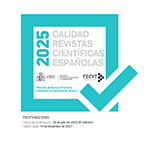Hard and soft news and bad practices in television newscasts
Abstract
The practice of journalism in television doesn’t respect ethical standards of professional exigency. The selection of hard and soft news made by channels indicates that TVs of public ownership are more exigent that privately owned ones in their exercise, because news related to politics and economy have primacy in the newscasts. However, the analysis of the treatment shows the opposite: public channels are more relaxed in the fulfilment of ethical principles. Results reveal that sensationalism and not to distinguish information and opinion are the most common mistakes. A total of 1,928 news items integrating evening newscasts of the six most widely watched TV channels in the Basque Country have been examined: La 1, Telecinco, Antena 3, laSexta, Cuatro and ETB2.Downloads
Article download
License
In order to support the global exchange of knowledge, the journal Estudios sobre el Mensaje Periodístico is allowing unrestricted access to its content as from its publication in this electronic edition, and as such it is an open-access journal. The originals published in this journal are the property of the Complutense University of Madrid and any reproduction thereof in full or in part must cite the source. All content is distributed under a Creative Commons Attribution 4.0 use and distribution licence (CC BY 4.0). This circumstance must be expressly stated in these terms where necessary. You can view the summary and the complete legal text of the licence.










